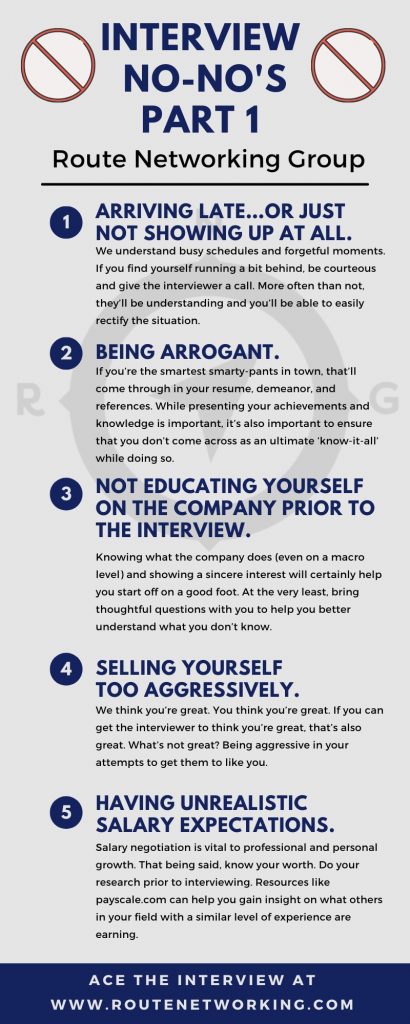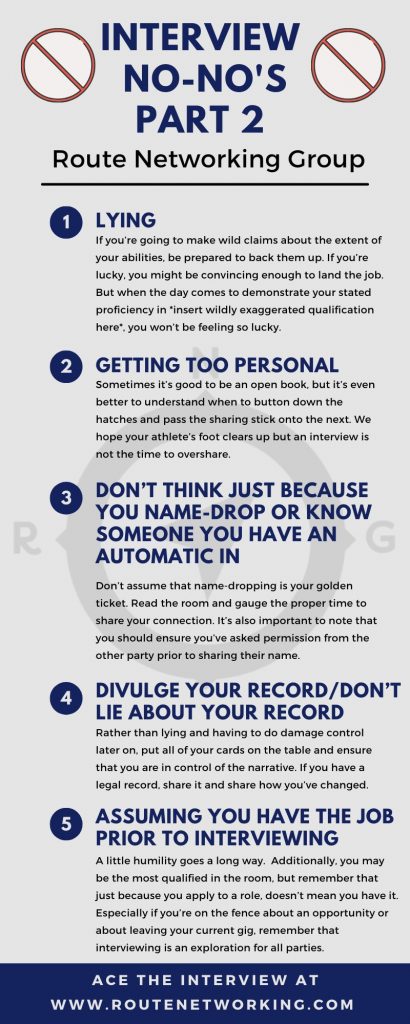10 Things To Avoid In An Interview
None of us enter an interview with the intent to fail.
That being said, there are endless ways to “do ya worst” interview-style; from oversharing, to jumping the salary-conversation gun too soon. They happen all too often to even the most polished professionals. So, in the words of Ice Cube, “You better check yo self before you wreck yo self,” with these interview faux pas.
Arriving late…or just not showing up at all.
We understand busy schedules and forgetful moments. If you find yourself running a bit behind, be courteous and give the interviewer a call. More often than not, they’ll be understanding and you’ll be able to easily rectify the situation. A situation you won’t be able to rectify? Not showing up to the interview, and failing to give the hiring manager a ring.
Being arrogant.
If you’re the smartest smarty-pants in town, that’ll come through in your resume, demeanor, and references. While presenting your achievements and knowledge is important, it’s also important to ensure that you don’t come across as an ultimate ‘know-it-all’ while doing so. Arrogance is to likability, as broccoli is to chocolate cake. They don’t mix. Confidence with a dash of humility will take you places.
Not educating yourself on the company prior to the interview.
Think of it like walking into a stranger’s home empty-handed and being like, “So, what’s what’s for dinner?” Hopefully we’re on all the same page with that being a major party foul. You don’t have to recite the history of the company, but do your research. Knowing what the company does (even on a macro level) and showing a sincere interest will certainly help you start off on a good foot. At the very least, bring thoughtful questions with you to help you better understand what you don’t know.
Selling yourself too aggressively.
We think you’re great. You think you’re great. If you can get the interviewer to think you’re great, that’s also great. What’s not great? Being aggressive in your attempts to get them to like you. Think of it a bit like a first date (gross cliche, but true nonetheless). Desperation is not attractive in your love-life, nor is it attractive in your work-life.
Having unrealistic salary expectations.
Salary negotiation is vital to professional and personal growth. That being said, know your worth. While we certainly don’t advocate for settling for less than you deserve, make sure your expectations are realistic. Do your research prior to interviewing. Resources like payscale.com can help you gain insight on what others in your field with a similar level of experience are earning. Setting realistic and attainable ambitions will help you be more successful when the time comes for salary negotiation, rather than just throwing out a pie-in-the-sky type figure. And, if the company asks, “What is your current salary?”, be ready to answer honestly. We see candidates try to skirt around this question and their hesitancy/circumventing attempts come off as dishonest. If your research tells you that you should be making much more than perhaps you say something like: “Currently I’m making $42,000 a year with XYZ Company, but I’ve been doing some research using Payscale and glassdoor and talking with individuals in my field and in a new position, I’d like to be closer to $55,000.”
Lying.
Don’t. Be. That. Guy (or Girl). If you’re going to make wild claims about the extent of your abilities, be prepared to back them up. If you’re lucky, you might be convincing enough to land the job. But when the day comes to demonstrate your stated proficiency in *insert wildly exaggerated qualification here*, you won’t be feeling so lucky. Even if the interviewer doesn’t call you out on your bluff during the interview, chances are they’ll be able to sense your dishonesty. Most importantly, realize that even if you aren’t qualified for the current open position, a position may arise down the line at that company that you ARE perfect for. Being honest about your limitations is almost always an attractive attribute and will ensure you maintain a positive relationship with the company.
Getting too personal.
Sometimes it’s good to be an open book, but it’s even better to understand when to button down the hatches and pass the sharing stick onto the next. We hope your athlete’s foot clears up and your sex life is healthy, but an interview is not the time to overshare.
Don’t think just because you name-drop or know someone you have an automatic in.
Sure, knowing someone within the company you’re interviewing at can certainly be worth mentioning, but be tactful with how you go about it. Don’t assume that name-dropping is your golden ticket. Read the room and gauge the proper time to share your connection. It’s also important to note that you should ensure you’ve asked permission from the other party prior to sharing their name.
Divulge your record/don’t lie about your record.
Google exists. Everyone makes mistakes, but don’t try to hide them, because odds are the hiring manager will find out. Rather than lying and having to do damage control later on, put all of your cards on the table and ensure that you are in control of the narrative. If you have a legal record, share it and share how you’ve changed.
Assuming you have the job prior to interviewing.
Go with confidence, but don’t go with delusion. A little humility goes a long way. Additionally, you may be the most qualified in the room, but remember that just because you apply to a role, doesn’t mean you have it. Especially if you’re on the fence about an opportunity or about leaving your current gig, remember that interviewing is an exploration for all parties. Just because you submit resume doesn’t mean the job is yours.
Our list of 10 Things To Avoid In An Interview could EASILY go in the the 20’s or 30’s but we’ll stop here for now! If you got the right stuff and are looking for a position, connect with us at www.routenetworking.com today!
Be that ALL-STAR jobseeker you know you are. 😉

10 Things To Avoid In An Interview: A nifty info graph you can save on your phone!

Did you know you could download our list of 10 Things To Avoid In An Interview?








